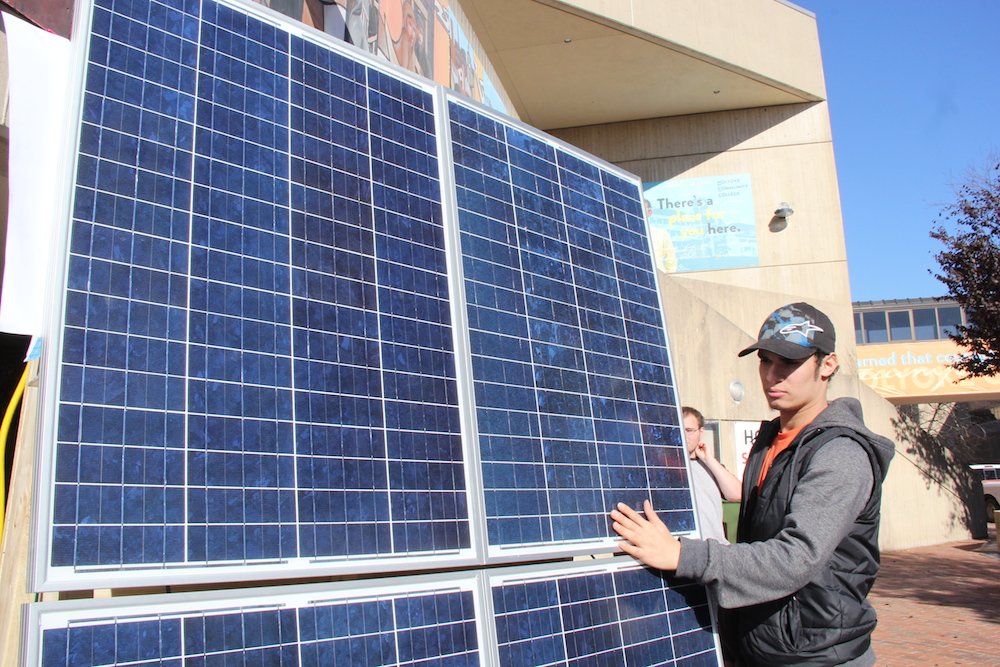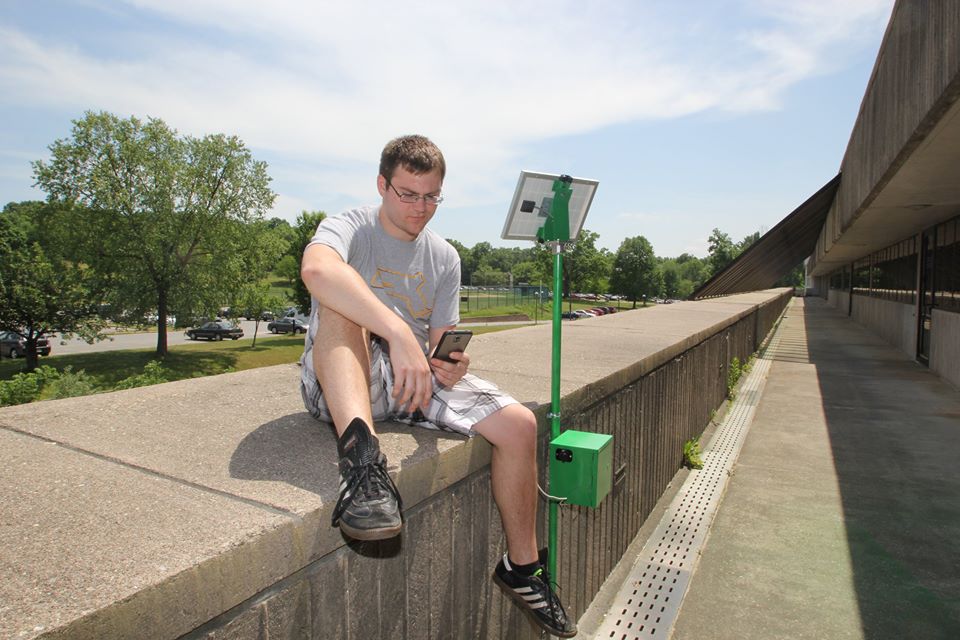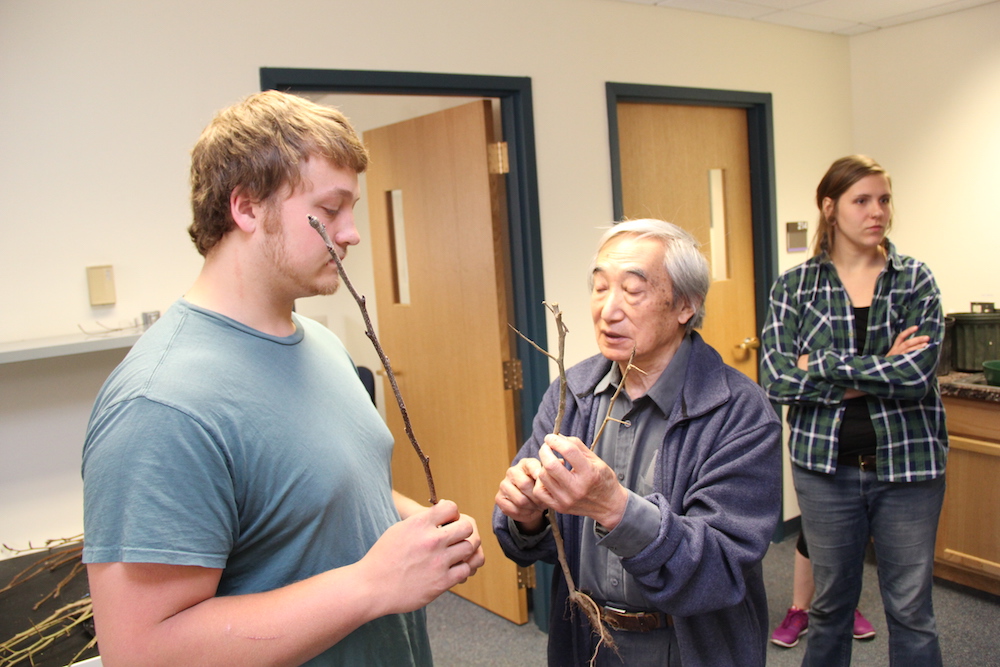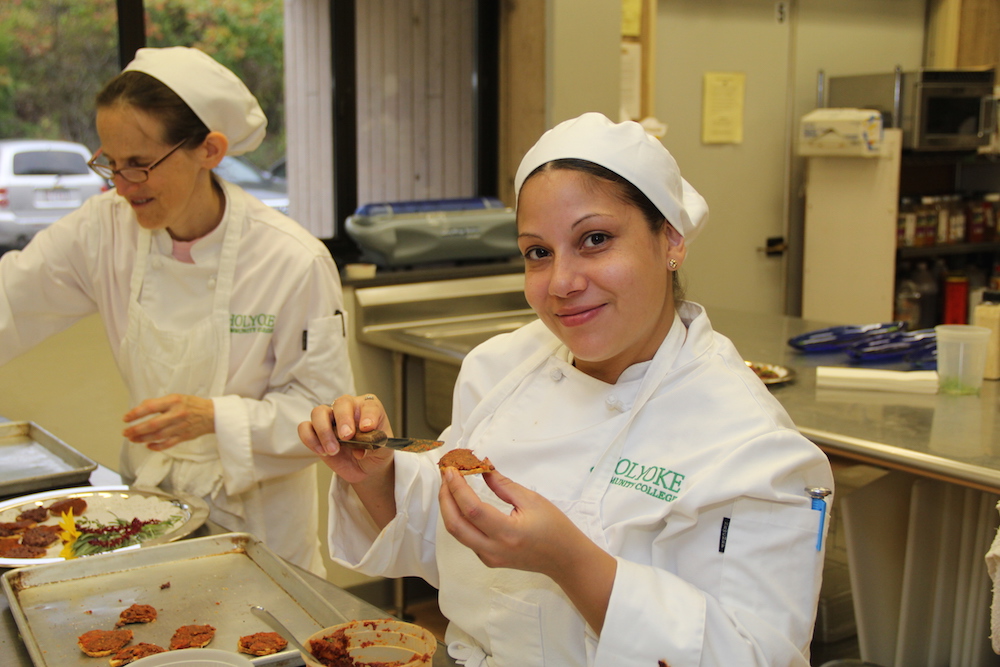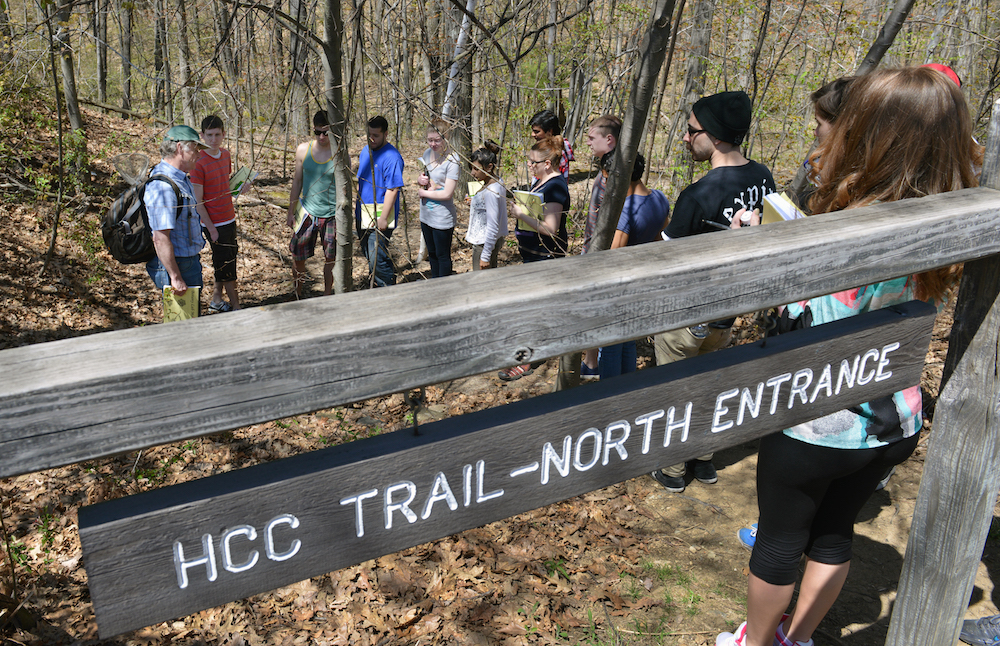Green Campus
Living sustainably is a priority for HCC.
From compostable utensils and cage-free eggs, to low-energy lighting and upgraded chillers, HCC is continually working toward reducing our carbon footprint and making choices that align with our values. Students, faculty, and staff have come together to develop a variety of projects and initiatives that will have a positive impact at HCC and in our community.
We are proud to be the only community college and one of just a few institutions chosen by the Commonwealth of Massachusetts to participate in its Zero Net Energy program. From upgrades to building systems, window replacements, stairwell insulation, weather-stripping and more, find out what we're doing to live more sustainably at HCC.
freight farms
A team of Holyoke residents and HCC students are collaborating to grow food in two refurbished shipping containers ("Freight Farms") in the heart of downtown Holyoke for local residents, businesses, and institutions!
The Freight Farms shipping containers located at 150 Race St. in Holyoke grow leafy greens and herbs without the use of soil. Each of the container farms can hold 256 grow towers with a capacity of 10-12 plants each, and can grow as much produce in a year as an acre of farmland. The shipping containers were delivered in April for a joint urban agriculture project that includes HCC, the city of Holyoke, and the community nonprofit Nuestras Raíces. The funds for the project, $208,000, were provided by the state through MassDevelopment as part of its Transformative Development Initiative, which is meant to accelerate economic growth in its Gateway Cities' communities. Read more.
phantom power reduction
Even when turned off, electronic devices that are plugged into wall sockets constantly draw energy, a phenomenon known as phantom power usage. HCC is implementing systems that reduce the amount of power drawn through electronics when they are not being used. The sum of every electronic device plugged in on campus amounts to one of the most significant energy uses at HCC, and therefore this project alone is expected to save approximately $65,000 annually. The savings may not be as substantial, but you can do the same thing at home. Unplug your toaster, microwave, and coffee maker. Consider putting your computer and printer on a power strip that you turn off when you're away from home.
greenhouse upgrades
Many students use HCC's greenhouse to allow for a longer planting season and also to be creative with what species of plants can be grown. It is a great space for classes such as botany and sustainable agriculture. After these upgrades, the greenhouse will be divided into two separate spaces, which will allow two different temperature set points and improved controls that will prevent simultaneous heating and cooling. The greenhouse structure itself will also be improved. These two projects will save about $1,220 annually.
rainwater harvesting
HCC students have often worked on ideas for rainwater harvesting, and this is now becoming a reality! Storage tanks are being set up around campus to capture rainwater, which will then be used throughout campus for landscape maintenance, as well as in HCC's organic garden. This small investment will save the college approximately $6,100 a year. Even where water is not scarce, harvesting rainwater at home is an easy way to keep your garden green without impacting public resources.
lighting controls
We're adding lighting controls to most lights on campus. Based on 6 a.m. to 9 p.m. operating hours, five days a week, just this small change is expected to save HCC approximately $4,331 annually. By including daylight sensors and dimming ballasts on the light controls, we can make use of natural light and save an additional $46 per unit.
photovoltaic/thermal solar
Typically, photovoltaic panels (better known as solar panels) and thermal solar systems are two separate entities. While they both use energy from the sun, solar panels use it to create electricity and thermal solar systems use it to heat water. A common problem with solar panels is that they become less efficient when they get too hot, so this combined system is a perfect match. The photovoltaic solar panels convert sunlight into electricity while the water travels through the panels to keep them from overheating. Then the recovered hot water can be used for heating, which will be the main use for this system. Electricity is an additional bonus — and HCC will also save approximately $500 a year.
Students
Holyoke Community College is proud to reinstate the Sustainability Club! Originally established by Kathleen Maiolatesi in 2010, our goal is to naturally and economically improve the campus by giving back to the community and the environment through sustainable practices. We're composed of students and staff who are passionate about sustainability, environmental conservation, agriculture, ecology, and earth sciences. Students are able to explore opportunities that they have interest in, such as local tours, workshops, and events, and are often involved with volunteer activities such as HCC's Earth Day celebration and the campus cleanup.
The club is currently renovating the organic produce and pollinator gardens behind the Marieb building for general use and enjoyment among students, staff, faculty, and surrounding Holyoke communities. If you have any comments, concerns, or suggestions for the garden, you can fill out the Google Form here.
It is a great way for students to get involved with the college and in the local community. Anyone is welcome to attend meetings or join us for special events or activities throughout the school year. We hope to see you around!
Students, faculty & staff
Change your behavior
Behavior modification alone can result in up to a 38% reduction in energy consumption for a college campus, which is equivalent to about $200,000 annually at HCC. These small lifestyle changes can make a huge difference:
- Recycle and compost: HCC has bins in the cafeteria that include a place for trash, recycling, and composting, as well as regular recycling bins throughout the campus. These bins are accompanied by posters that have a simple layout describing which items can go into which bins. We have a composting system on campus, which is a great way to recycle nutrients back into the earth. Approximately 29% of U.S. greenhouse gas emissions are the result of obtaining new products, from the extraction of raw materials to manufacturing and transportation. The fewer items that go to waste, the better! But remember, while recycling is a necessary effort, the best way to reduce your carbon footprint is by reducing use in the first place. Reduce, reuse, and recycle.
- Carpool: HCC has a conveniently located carpool lot right next to the Kittredge Center to reward students who are able to reduce their carbon footprint by carpooling. Carpooling even just once a week can reduce gas emissions by as much as 20%. You can better the environment and also have a shorter walk to class. Better yet, if you live close to HCC, think about walking or riding your bike. HCC also has public transportation. Buses run daily to and from the school that have bicycle racks on the front so you can bring a bike to use around campus.
- BICYCLING - Bike racks are located around campus. Showers and lockers can be found at the Bartley Center for Athletics.
- Use your hands: Like most large institutions, HCC has electronic buttons to open doors. While these automatic door openers were created for students in wheelchairs or for those who may have difficulty opening the doors using handles, many other people use these buttons unnecessarily. Every time someone pushes that button without really needing to, energy is wasted (and money)! Even though it may amount to pennies per instance, over time that energy waste adds up. Additionally, the door stays open longer when the automatic button is used, so energy systems used for heating and cooling the buildings are compromised.
- Turn off and shut down: Turn off the lights! If you don't work in an office with an automated light sensor, make sure you shut the lights off if you're the last one out of the room. Similarly, shut down your computer and other electronic devices when you are done with them. If you can, unplug them! Electronics use energy, even if they are off and remain plugged in. Plug loads can be responsible for up to 20% of a campus's energy use, so along with the retrofit for phantom plug load reduction, try to refrain from leaving your electronic devices plugged in unless it is absolutely necessary.
- Think before you buy: Approximately 13% of U.S. greenhouse gas emissions come from the production and transportation of food. Buying locally-sourced foods reduces your footprint and supports your local economy. Consider how that food was produced: Was it grown using environmentally harmful chemicals? Were the animals raised humanely? When buying other products, think about how far the item traveled to get to your door and how much packaging was used to get it there. Is it reusable or recyclable? Do you even need it? Every dollar you spend is a vote you make. Making sure your purchases are sustainable is the best way to ensure you are not harming the earth.
Have more ideas, or want to get involved in campus sustainability? Send an email!
What is the Commonwealth's Accelerated Energy Program (AEP)?
The AEP is a three-year initiative to accelerate the implementation of energy and water efficiency projects at 700 state sites, which include more than 4,000 buildings and 58 million square feet. This program will significantly reduce energy use, cost, and greenhouse gas emissions while creating clean energy jobs.
What are the expected energy and environmental gains?
The Commonwealth has targeted a 20-25 percent energy consumption reduction over all the sites in the AEP and will save an estimated 135,000 metric tons of greenhouse gas emissions each year, the equivalent of removing more than 26,000 passenger vehicles from the road annually.
What is the time frame for completion?
Major work will be completed by the end of August and all work will be completed by the end of the 2016.
Will all 700 sites require similar implementation plans?
No, AEP is a multi-tiered approach, implementing energy and water projects at large sites such as hospitals, colleges, and prisons; small sites such as police barracks and career centers; and seasonal use sites, like ice rinks and state parks. More than 60 percent of the projects are designated as "Simple Fix", which will focus primarily on efficiency measures such as lighting and water fixture upgrades and work with existing utility incentive programs. About 5 percent of the sites are much larger, making 70 percent of the AEP sites' square footage; these will undergo major equipment upgrades.
What are the projected energy costs and savings?
Through an investment of $470 million, the AEP is expected to save the Commonwealth approximately $43 million annually in energy costs. Currently, the 700 sites in the program have energy costs of approximately $185 million.
How does this program support statewide clean energy policies?
Efforts under the AEP support the state's Leading By Example Program, which was established by Executive Order N. 484 (E0484). E.O. 484, and calls for energy use and greenhouse gas emission reductions and an increase in renewable energy installation across state facilities. The AEP also supports the goals of the "Massachusetts Clean Energy and Climate Plan for 2020," which established a Commonwealth-wide greenhouse gas emission reduction target of 25 percent by 2020. It will also help Massachusetts maintain its top national ranking for energy efficiency from the American Council for an Energy Efficient Economy.
How is AEP being funded?
The Accelerated Energy Program is funded through a variety of public and private channels; including the state's Clean Energy Investment Program, which uses project savings to pay for capital costs; the issuing of general obligation bonds (20 percent) and initiatives from Mass Save. The Commonwealth is actively seeking other funding that will help to offset the amount of state bond funds needed.
Who are the AEP partners?
AEP partners include a variety of state and private entities, among them the Division of Capital Asset Management & Maintenance, the Department of Energy Resources, the Executive Office of Labor and Workforce Development, public higher education campuses, executive branch agencies, the Massachusetts Department of Transportation, and electric and gas utilities.
Will this initiative create jobs?
As part of the Commonwealth's broader efforts to promote and support clean energy companies and jobs, AEP is expected to generate an estimated 3,800 to 4,200 clean energy jobs across the Commonwealth.



